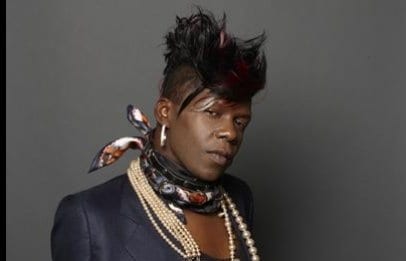There have been several prominent strongly voiced female bounce rappers, but for some reason they haven’t bonded with straight and lesbian women like the Queen Diva of bounce music, Big Freedia. And when Big Freedia (pronounced Freeda) last headlined Montreal, at The Belmont during Pop Montreal, hundreds of girls showed to dance up a storm.
“Bounce music is not just connected to gay audiences. It’s been around for years before I started and is performed mostly by straight entertainers,” says Big Freedia, the stage name of Freddie Ross, who was nominated for GLAAD Media Award earlier this year and was named Best Emerging Artist and Best Hip-Hop/Rap Artist at the Best of the Beat Awards in January 2011.
Bounce music is a hip-hop hybrid that emerged about 20 years ago. Basically, it’s rap delivered over a sampled dance beat, like Big Freedia’s Rock Around the Clock, which begins with a sample from the Bill Haley classic. Make no mistake; bounce is strictly party music. But it isn’t misogynistic, which helps explain its huge popularity among women.
“My friend [bounce rapper] Katey [Red] was the first male trans to come out in the world of bounce music,” says Big Freedia. “We started to work together in 1999 when bounce exploded out of the gay scene and everybody flipped out!” she says. “If my touring around the world is any indication – I’m headlining concerts in Amsterdam, London and Paris after I leave Montreal – it’s going to hit the mainstream soon. My mission is to mix audiences up – black and white, gay and straight – so that we can all feel free to express our sexuality on the dancefloor.”
Like other so-called sissy bounce artists – a term bounce performers do not like; whatever you do, do not call Big Freedia a sissy to her face – Big Freedia has already achieved mainstream success in her hometown, New Orleans, with several hit singles, such as Gin in My System and her anthemic Azz Everywhere!
That has a lot to do with the fact that she performs roughly 600 shows per year, often at several venues per night, where she’ll perform a five or six-song set at each.
“I work six nights a week back in New Orleans, and when I’m on the road, I’ll often do four or five venues in one night,” she says. “In Austin [earlier this year] I had 11 shows in one weekend. I’m just working hard to get my name out there.”
In a strange and tragic twist of fate, it was the aftermath of Hurricane Katrina that really helped spread bounce music beyond New Orleans. Big Freedia, Katey Red, Nobby and dozens of other bounce artists were exiled from New Orleans for several months to other cities like Baton Rouge, Atlanta and Houston. Here they began staging bounce shows for locals and a phenomenon was born. For Big Freedia, who grew up in the housing projects of New Orleans’ 3rd Ward and who also runs a successful decorating business (she counts the mayor of New Orleans as one of her clients), Katrina really was a blessing in disguise.
“New Orleans used to be the murder capital of America. But Katrina changed us,” she explains. “I was stuck in the city during Katrina and it was an experience I’ll never forget. Then to see it all on TV…. But it needed to happen to change New Orleans. Katrina not only changed the politics of the city, it helped lower the crime rate. The city is definitely looking better because we got a much-needed facelift. We opened our eyes. Katrina made us appreciate what we have in life.”
That positive spin on life is also one of the infectious grooves at the root of Big Freedia’s roof-raising interpretation of bounce music.
“I’m a big black guy and my mission is take this music around the world,” says Big Freedia, who was recently profiled in The New York Times. “I’m very protective of this music and its legacy. People everywhere are dancing to bounce music now. There is a time and season for everything, and it’s the time for bounce music.”


 Why you can trust Xtra
Why you can trust Xtra


